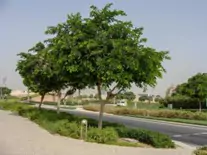Pongam Tree
The Pongam tree (Millettia pinnata), also known as Pongamia or Indian beech, is a fast-growing tree from the legume family (Fabaceae). Native to tropical and subtropical regions of India, Southeast Asia, and Australia, the Pongam tree is widely valued for its ability to thrive in poor soils and is highly drought-resistant. It has gained popularity for its ornamental beauty, medicinal uses, and sustainable applications, including biofuel production and soil enrichment.
Pongam trees grow to a height of 12–18 meters (39–59 feet), with a dense canopy of green, glossy leaves that offer ample shade. The tree’s bark is thick and rough, often used for timber and firewood. The flowers are small, pinkish-white to purple, and bloom in attractive clusters. Following flowering, the tree produces flat, brown pods containing a single seed.
Uses
The Pongam tree is highly versatile, with various parts offering ecological, medicinal, and practical applications.
- Biofuel Production: Pongam seeds are rich in oil, which can be extracted and processed into biodiesel. This biofuel is renewable and environmentally friendly, making Pongam a valuable resource in sustainable energy.
- Soil Restoration: As a leguminous plant, Pongam is known to improve soil fertility by fixing nitrogen, making it suitable for reforesting degraded lands and preventing soil erosion.
- Traditional Medicine: The tree’s seeds, bark, and leaves have long been used in traditional medicine. Pongam oil, often referred to as Karanja oil, is applied to treat skin ailments, rheumatism, and inflammation due to its antiseptic and anti-inflammatory properties.
- Animal Feed and Pest Control: Pongam leaves are sometimes used as green manure, and its oil acts as a natural pesticide, making it beneficial in organic farming.
